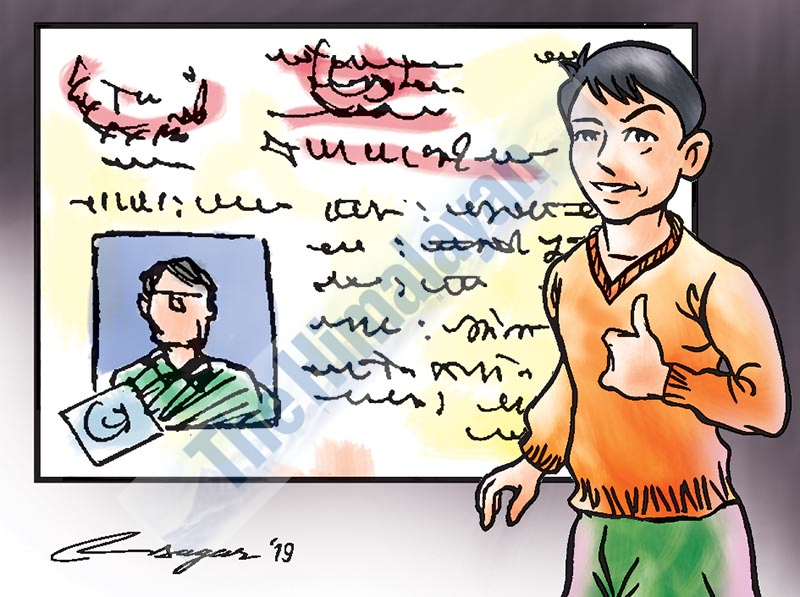One’s identity, one’s pride: No need for consolation
Concealing one’s caste and changing the surname or one’s religion can’t solve the social problems, rather they only weaken the identity and history of the Dalit community
I got goosebumps when my little brother proudly said that he was a Damai and proud to be one. I haven’t seen such a rebellious person at such a young age.
Generally young people from our community feel uneasy to reveal their identity.
Actually nobody likes to face discrimination in public. If somebody mistakenly says he or she is a Pariyar, BK or Nepali, then he/she has to face many questions.
In our society, caste is a major concern of the people.
Usually caste is regarded as the main source of identity, and in society, people behave on this basis.
Still in many of Nepal’s villages, people use the word timi (Nepali word used to call a junior) to address elderly Dalits. When one’s caste does not even allow reverence to an elderly Dalit, it is natural for people to conceal their identity.
Some have even changed their religion to unburden themselves of the caste system.
We three brothers used to study in the same school but at different levels. One day in the social studies class of my little brother, the teacher was teaching about the caste system, culture, religion and community.
Suddenly he gave an example of my brother and said Kranti is from the Dalit community, but we shouldn’t discriminate against him. In the middle of the class, my brother got up and said, “Sir, I am a Damai, and I am proud to be one, and I love my culture. I don’t need any sympathy or consolation.”
He said that he didn’t mind if anybody wanted to discriminate against him on the basis of his caste.
“Let them practice inhumanity.
How can an individual be upper and another lower in position in society based on caste?” Why can’t we stamp out such ill practices from the society, he questioned. “Even our constitution says everyone is equal. There shall be no discrimination on the basis of caste, colour and race.
So, why do you say somebody is of a low or high caste? Shame on those who sympathise with me because I am a Damai.”
After hearing from my brother, one student stood up and said, “Sir, I am also a Dalit and belong to a caste lower than that of Kranti.”
He also added that his parents tried to conceal their caste because people might make fun of them or discriminate against them.
“Therefore, to stay away from discrimination, we have changed our caste. We have concealed our real identity, sir. But from now on, I will not hide my caste rather I will explore it. The Dalit community needs youths like Kranti, who is proud of his identity, caste and culture and ready to fight against discrimination through a non-violent movement.”
Apart from my brother, my father also faced many questions related to caste during his visits to Kathmandu and India. When my father came to Kathmandu, the houseowner asked what his caste was.
My father cleverly answered, a To-thapa, which in Khas Nepali translates as ‘know yourself’. The houseowner thinking that Tothapa was a sub-caste of a Thapa, a high caste in Nepal, didn’t ask further questions.
He knew well that if he revealed his identity, he would not be given a room.
Similarly in India, when people asked the caste of my father, he said Barabar, meaning equal. According to my father, Indians think that Barabar is like a Brahmin as the two sound similar.
Then after, he was asked to show the Janai, or sacred thread. So he showed them the kanne dori, the thread that is tied at the waist by the sudras, or Dalits. Again the Indians asked why he wore the thread around the waist. My father replied that people from the Himalayas wore them around the waist.
Actually, to avoid castebased questions and humiliation, people from the Dalit community hide their identity. There are many stories of caste discrimination in our society. Many Dalits have been beaten, humiliated and some even killed. Caste has been used to isolate the Dalits from the mainstream. So to be on the safe side, Dalits try to pose themselves as high caste people.
Despite the discrimination faced in society, I would like to share one thing about my family. We are proud of our caste, culture and history. We love to shout and say that we are Damai by caste. But it doesn’t mean that we love discrimination. Instead we are proud with the Damai’s identity and culture. In our cultural programmes, we play the musical instruments played by the Damai during special occasions – the sanai and damaha.
Some people might say that we benefit from being a Damai. But we have never asked for any largesse from the government or anyone.
We can survive on our own with our hard work. What is the use of reservation which tags you as a minority or a weak person compared to others? We have to erase these tags and stop these reservations.
Indeed concealing one’s caste and changing the surname or one’s religion can’t solve these social problems, rather they only weaken the identity and history of the Dalit community.
Caste hasn’t brought discrimination, rather it is the so-called norms, values, rites and rituals of society which discriminate against people and bring division among the people.
Certain religious rites and rituals should be erased for maintaining social harmony, integration and mutual cooperation in society. Once these stereotypical thoughts are removed from our society, there will be no need for the word Dalit. Indeed Dalit is not a caste, it’s a culture: it’s a term that unites the people of so-called low castes.
The term Dalit will stay alive until such people are not emancipated.






